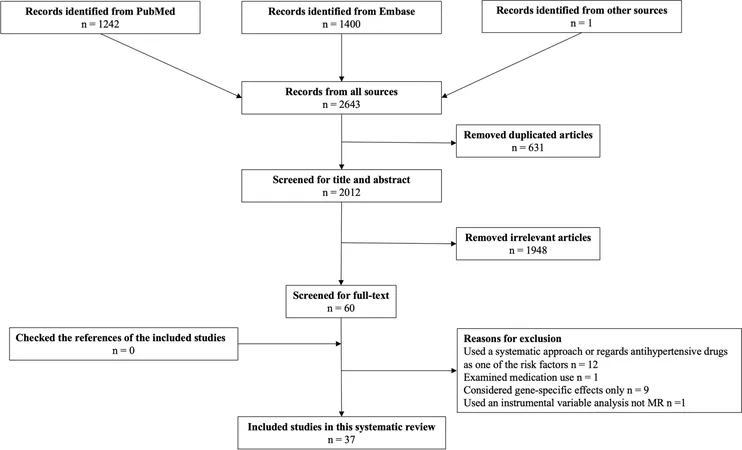
Are You Aware of the Shocking Causes of Male Infertility? International Men's Day 2024 Shines a Light!
2024-11-19
Author: Arjun
Understanding Male Infertility
So, what exactly is male infertility? This condition is characterized by a man's reduced ability to conceive a child due to problems with sperm production or function. As Dr. Chetna Jain, an obstetrician and gynecologist, points out, male infertility is often a symptom of underlying health issues or lifestyle choices rather than a standalone condition. Issues can stem from medical, genetic, environmental, or lifestyle factors, with signs often extending beyond just difficulties in conceiving.
Major Causes of Male Infertility
1. Medical Factors - Varicocele: An enlarged vein in the scrotum that hampers temperature regulation, affecting sperm quality and quantity. It's the leading cause of male infertility, impacting around 40% of men experiencing fertility challenges. - Infections: Conditions such as orchitis or sexually transmitted infections can lead to sperm blockages and damage. - Ejaculation Disorders: Disorders like retrograde ejaculation can result from diabetes, spinal injuries, or certain surgeries, redirecting sperm into the bladder instead of out through the penis. - Hormonal Imbalances: Imbalances in hormones like testosterone can hinder sperm production and drive libido down.
2. Environmental Influences - Heat Exposure: Regular use of saunas or hot tubs can adversely affect sperm production. A 2013 study linked increased temperatures to lower sperm counts. - Radiation and Toxins: Exposure to harmful chemicals or radiation can interfere with sperm production, making it another significant environmental risk.
3. Lifestyle Choices - Substance Abuse: Smoking, excessive alcohol, and drug use can drastically reduce sperm quality and quantity. A 2015 study found that smoking affects semen quality in various aspects. - Obesity: Weight struggles can disrupt hormone levels and negatively impact sperm quality—every 9 kg of excess weight increases infertility risk by 10%. - Stress: High stress levels can lead to hormonal imbalances, which in turn may reduce sperm production.
4. Other Contributing Causes - Medications: Certain medications, including antihypertensives and antifungal drugs, can negatively affect sperm production. - Medical Conditions: Men with diabetes often experience fertility issues due to low sperm quality or erectile dysfunction.
Proven Strategies to Boost Male Fertility
1. Adopt a Nutrient-Rich Diet: Focus on foods rich in zinc, such as shellfish and nuts, to support sperm health. Vitamins C and E can help protect sperm from oxidative damage. 2. Stay Hydrated: Adequate water intake is vital; aiming for 2 to 3 liters daily can enhance semen volume. 3. Maintain a Healthy Weight: Regular exercise and a balanced diet play a crucial role in weight management and overall health. 4. Manage Stress Levels: Engaging in mindfulness practices or hobbies can help minimize stress, promoting better hormonal balance. 5. Avoid Harmful Substances: Quitting smoking and moderating alcohol intake can enhance fertility prospects. 6. Protect Against Heat: Encourage the avoidance of saunas and hot tubs to keep testicular temperatures optimal for sperm production. 7. Consider Supplements: Fertility-boosting supplements such as Coenzyme Q10 and L-Carnitine might aid in improving sperm motility and energy. 8. Seek Medical Help: If necessary, doctors can prescribe hormonal treatments or conduct surgeries to correct underlying health issues.
As we celebrate International Men's Day this year, it's crucial to spread awareness about male infertility. By taking proactive steps to improve health and lifestyle, men can significantly enhance their chances of fatherhood. Don’t let these hidden factors stand in your way—recognize them and take action now!




 Brasil (PT)
Brasil (PT)
 Canada (EN)
Canada (EN)
 Chile (ES)
Chile (ES)
 España (ES)
España (ES)
 France (FR)
France (FR)
 Hong Kong (EN)
Hong Kong (EN)
 Italia (IT)
Italia (IT)
 日本 (JA)
日本 (JA)
 Magyarország (HU)
Magyarország (HU)
 Norge (NO)
Norge (NO)
 Polska (PL)
Polska (PL)
 Schweiz (DE)
Schweiz (DE)
 Singapore (EN)
Singapore (EN)
 Sverige (SV)
Sverige (SV)
 Suomi (FI)
Suomi (FI)
 Türkiye (TR)
Türkiye (TR)